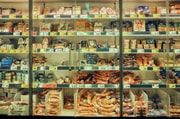Are you feeding your dog these 16 surprisingly dangerous foods? Vets say you should stop now
- Replies 0
If your dog has ever lunged for a fallen grape or tried to steal a bite of your sandwich, you’re not alone.
Dogs are expert scavengers—and unfortunately, not everything they eat is safe. While some foods seem harmless to us, they can cause serious, even fatal, problems for your pup.
We reviewed the latest vet-backed research to bring you the definitive list of 16 everyday foods that could put your dog at risk.
1. Cooked Bones
Cooked bones may look like the perfect treat, but they can splinter into razor-sharp shards once chewed. These fragments can get lodged in your dog’s throat or cause tears in the stomach or intestines.
“The cooking process makes bones more brittle,” explains Dr. Danielle Bernal, DVM, which increases the risk of internal injuries. For safer chewing, offer raw bones under supervision or opt for vet-approved alternatives.
2. Dairy Products
Many dogs are lactose intolerant and lack the enzyme needed to digest dairy properly. “Just like in people who have this condition, eating things like milk, cheese, and ice cream can lead to a variety of stomach issues,” says veterinarian Dr. Sonja Olson.
Expect vomiting, diarrhea, and cramps—none of which your dog will thank you for. Instead of sharing your ice cream, offer dog-safe frozen treats.
3. Macadamia Nuts
Just a few macadamia nuts can cause serious reactions in dogs, including vomiting, tremors, and even temporary paralysis. “A dose of about two nuts per pound of a dog’s body weight can result in poisoning,” warns veterinarian Dr. Justine Lee.
The high fat content can also trigger pancreatitis, especially in smaller breeds. If you keep macadamias at home, store them well out of reach.
4. Garlic, Onions, and Leeks
These common ingredients belong to the allium family, which can destroy a dog’s red blood cells and cause anemia. “They’re only a serious issue, however, when eaten raw and in large amounts,” notes Dr. Lee—but even powdered forms in leftovers can be risky.
Symptoms may not appear for days, making them especially dangerous. Avoid feeding dogs anything seasoned or spiced with onion or garlic.
5. Bacon
This breakfast staple is loaded with fat and salt that dogs simply can’t handle in large amounts. “Contains high levels of sodium and fat that can lead to upset stomach or even pancreatitis,” says Dr. Olson.
Over time, bacon can also contribute to sodium ion poisoning, which is life-threatening. Save the bacon for yourself and reward your dog with lean, cooked meats instead.
6. Raw Dough
Unbaked dough rises in your dog’s stomach just like it does in your oven—and that’s a serious problem. “The dough continues to rise in their stomach and can extend their entire abdomen,” warns Dr. Bernal, leading to extreme pain and dangerous blockages.
Fermenting dough also releases alcohol, which can cause alcohol poisoning. Keep raw dough far from your dog’s curious nose.
Also read: Pet owners beware: Are your dogs secretly spreading deadly infections?
7. Avocados
Avocados contain persin, a toxin that can upset your dog’s stomach and cause vomiting. But the bigger concern is the slippery pit, which is easy to swallow and hard to pass.
“The pit can get lodged in a dog’s throat or stomach,” Dr. Lee says, often requiring surgery. If you’re making guac, keep bowls and scraps out of paw’s reach.
8. Peaches and Plums
The flesh of these fruits is generally safe in small amounts, but the pits pose a triple threat: choking, intestinal blockage, and cyanide poisoning.
“They can also release cyanide inside your dog’s stomach,” explains Dr. Lee. Swallowed pits often require surgical removal and can be fatal if untreated. Always remove pits and keep stone fruits away from unsupervised dogs.
9. Corn on the Cob
While plain corn isn’t toxic to dogs, the cob is a major hazard due to its shape and indigestibility. “It can become a major hazard because the cob is the perfect size to get stuck in the intestinal tract,” Dr. Lee explains.
Worse, it may not show up on X-rays, delaying emergency surgery. Always discard corn cobs immediately and securely.
10. Chocolate
Chocolate contains theobromine and caffeine—both toxic to dogs. “Chocolate-covered espresso beans are a double-whammy,” Dr. Olson says, combining caffeine and theobromine in one bite.
Symptoms include vomiting, seizures, heart arrhythmia, and potentially death. Keep all chocolate (especially dark and baking varieties) locked away.
11. Grapes and Raisins
Even a small number of grapes or raisins can trigger kidney failure in dogs, and there’s no way to predict which dogs are most vulnerable.
“I’ve seen dogs that have had only a couple of raisins go into horrible kidney failure,” Dr. Lee warns. These fruits can also hide in trail mixes, cereals, and baked goods. When in doubt, don’t share.
12. Alcohol
Dogs are much more sensitive to alcohol than humans, and even a small amount can cause severe toxicity. “Their enzymes are similar to ours, but the effects of alcohol are more potent,” says Dr. Olson.
Liquor, beer, and especially sweet cocktails should be kept far away from curious pups. Symptoms include vomiting, disorientation, tremors, and potentially coma.
Also read: Eggs for dogs: Is your dog’s breakfast actually safe?
13. Coffee and Caffeine
Coffee is another caffeine source that’s highly dangerous to dogs, especially in concentrated forms like espresso or energy drinks.
“Coffee acts like a stimulant in dogs,” explains Dr. Olson, “and causes an increased heart rate, panting, heart arrhythmia, high blood pressure, tremors and seizures.” Grounds and chocolate-covered beans are especially risky. Avoid spills and clean up coffee messes immediately.
14. Sugar-Free Gum and Candy
Xylitol, a popular sugar substitute, is deadly to dogs even in small doses. “It causes dogs’ insulin levels to spike as well as serious liver problems,” says Dr. Olson.
A single stick of gum can be fatal, and it’s often found in purses or low drawers. If xylitol is listed in the first five ingredients, it’s not safe to share.
15. White Bread
Although a bite of plain bread won’t hurt most dogs, white bread is often full of sugar and oil. “He was so sick,” Dr. Olson says of a schnauzer who ate a whole loaf and was hospitalized for days.
Too much can lead to pancreatitis and long-term digestive issues. Skip the toast and offer plain rice or veggies instead.
16. Salty Snacks
A few chips might only make your dog thirsty—but in large amounts, salt can cause tremors and seizures. “Large amounts of sodium can cause serious issues,” says Dr. Bernal, especially in small or elderly dogs.
Dogs don’t need extra salt, and their systems aren’t built to handle it. Choose low-sodium treats or natural chews.
Read next: Could a new pill help your pet live longer—and maybe you, too?

Have you ever had to call the vet over something your dog ate? Share your experiences in the comments, and let other pet owners learn from your story.
Dogs are expert scavengers—and unfortunately, not everything they eat is safe. While some foods seem harmless to us, they can cause serious, even fatal, problems for your pup.
We reviewed the latest vet-backed research to bring you the definitive list of 16 everyday foods that could put your dog at risk.
1. Cooked Bones
Cooked bones may look like the perfect treat, but they can splinter into razor-sharp shards once chewed. These fragments can get lodged in your dog’s throat or cause tears in the stomach or intestines.
“The cooking process makes bones more brittle,” explains Dr. Danielle Bernal, DVM, which increases the risk of internal injuries. For safer chewing, offer raw bones under supervision or opt for vet-approved alternatives.
2. Dairy Products
Many dogs are lactose intolerant and lack the enzyme needed to digest dairy properly. “Just like in people who have this condition, eating things like milk, cheese, and ice cream can lead to a variety of stomach issues,” says veterinarian Dr. Sonja Olson.
Expect vomiting, diarrhea, and cramps—none of which your dog will thank you for. Instead of sharing your ice cream, offer dog-safe frozen treats.
3. Macadamia Nuts
Just a few macadamia nuts can cause serious reactions in dogs, including vomiting, tremors, and even temporary paralysis. “A dose of about two nuts per pound of a dog’s body weight can result in poisoning,” warns veterinarian Dr. Justine Lee.
The high fat content can also trigger pancreatitis, especially in smaller breeds. If you keep macadamias at home, store them well out of reach.
4. Garlic, Onions, and Leeks
These common ingredients belong to the allium family, which can destroy a dog’s red blood cells and cause anemia. “They’re only a serious issue, however, when eaten raw and in large amounts,” notes Dr. Lee—but even powdered forms in leftovers can be risky.
Symptoms may not appear for days, making them especially dangerous. Avoid feeding dogs anything seasoned or spiced with onion or garlic.
5. Bacon
This breakfast staple is loaded with fat and salt that dogs simply can’t handle in large amounts. “Contains high levels of sodium and fat that can lead to upset stomach or even pancreatitis,” says Dr. Olson.
Over time, bacon can also contribute to sodium ion poisoning, which is life-threatening. Save the bacon for yourself and reward your dog with lean, cooked meats instead.
6. Raw Dough
Unbaked dough rises in your dog’s stomach just like it does in your oven—and that’s a serious problem. “The dough continues to rise in their stomach and can extend their entire abdomen,” warns Dr. Bernal, leading to extreme pain and dangerous blockages.
Fermenting dough also releases alcohol, which can cause alcohol poisoning. Keep raw dough far from your dog’s curious nose.
Also read: Pet owners beware: Are your dogs secretly spreading deadly infections?
7. Avocados
Avocados contain persin, a toxin that can upset your dog’s stomach and cause vomiting. But the bigger concern is the slippery pit, which is easy to swallow and hard to pass.
“The pit can get lodged in a dog’s throat or stomach,” Dr. Lee says, often requiring surgery. If you’re making guac, keep bowls and scraps out of paw’s reach.
8. Peaches and Plums
The flesh of these fruits is generally safe in small amounts, but the pits pose a triple threat: choking, intestinal blockage, and cyanide poisoning.
“They can also release cyanide inside your dog’s stomach,” explains Dr. Lee. Swallowed pits often require surgical removal and can be fatal if untreated. Always remove pits and keep stone fruits away from unsupervised dogs.
9. Corn on the Cob
While plain corn isn’t toxic to dogs, the cob is a major hazard due to its shape and indigestibility. “It can become a major hazard because the cob is the perfect size to get stuck in the intestinal tract,” Dr. Lee explains.
Worse, it may not show up on X-rays, delaying emergency surgery. Always discard corn cobs immediately and securely.
10. Chocolate
Chocolate contains theobromine and caffeine—both toxic to dogs. “Chocolate-covered espresso beans are a double-whammy,” Dr. Olson says, combining caffeine and theobromine in one bite.
Symptoms include vomiting, seizures, heart arrhythmia, and potentially death. Keep all chocolate (especially dark and baking varieties) locked away.
11. Grapes and Raisins
Even a small number of grapes or raisins can trigger kidney failure in dogs, and there’s no way to predict which dogs are most vulnerable.
“I’ve seen dogs that have had only a couple of raisins go into horrible kidney failure,” Dr. Lee warns. These fruits can also hide in trail mixes, cereals, and baked goods. When in doubt, don’t share.
12. Alcohol
Dogs are much more sensitive to alcohol than humans, and even a small amount can cause severe toxicity. “Their enzymes are similar to ours, but the effects of alcohol are more potent,” says Dr. Olson.
Liquor, beer, and especially sweet cocktails should be kept far away from curious pups. Symptoms include vomiting, disorientation, tremors, and potentially coma.
Also read: Eggs for dogs: Is your dog’s breakfast actually safe?
13. Coffee and Caffeine
Coffee is another caffeine source that’s highly dangerous to dogs, especially in concentrated forms like espresso or energy drinks.
“Coffee acts like a stimulant in dogs,” explains Dr. Olson, “and causes an increased heart rate, panting, heart arrhythmia, high blood pressure, tremors and seizures.” Grounds and chocolate-covered beans are especially risky. Avoid spills and clean up coffee messes immediately.
14. Sugar-Free Gum and Candy
Xylitol, a popular sugar substitute, is deadly to dogs even in small doses. “It causes dogs’ insulin levels to spike as well as serious liver problems,” says Dr. Olson.
A single stick of gum can be fatal, and it’s often found in purses or low drawers. If xylitol is listed in the first five ingredients, it’s not safe to share.
15. White Bread
Although a bite of plain bread won’t hurt most dogs, white bread is often full of sugar and oil. “He was so sick,” Dr. Olson says of a schnauzer who ate a whole loaf and was hospitalized for days.
Too much can lead to pancreatitis and long-term digestive issues. Skip the toast and offer plain rice or veggies instead.
16. Salty Snacks
A few chips might only make your dog thirsty—but in large amounts, salt can cause tremors and seizures. “Large amounts of sodium can cause serious issues,” says Dr. Bernal, especially in small or elderly dogs.
Dogs don’t need extra salt, and their systems aren’t built to handle it. Choose low-sodium treats or natural chews.
Read next: Could a new pill help your pet live longer—and maybe you, too?
Key Takeaways
- Chocolate, grapes, macadamia nuts, and xylitol are extremely toxic to dogs and can cause seizures, organ failure, or death.
- Common items like cooked bones, corn cobs, and fruit pits can lead to choking or deadly blockages.
- Alcohol, caffeine, and raw dough pose severe poisoning risks that often require emergency treatment.
- To protect your dog, store risky foods out of reach, clean up spills, and never assume a human-safe snack is pup-safe.







